Related Research Articles

Darkness in El Dorado: How Scientists and Journalists Devastated the Amazon is a book written by author Patrick Tierney in 2000, in which the author accuses geneticist James Neel and anthropologist Napoleon Chagnon of conducting human research without regard for their subjects' well-being while conducting long-term ethnographic field work among the indigenous Yanomamo, in the Amazon basin between Venezuela and Brazil. He also wrote that the researchers had exacerbated a measles epidemic among the Native Americans, and that Jacques Lizot and Kenneth Good committed acts of sexual impropriety with Yanomamo.
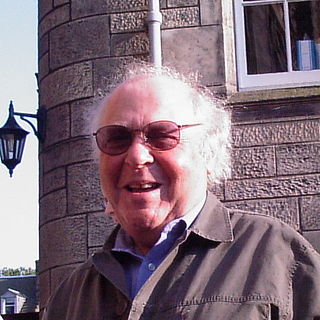
Marshall David Sahlins was an American cultural anthropologist best known for his ethnographic work in the Pacific and for his contributions to anthropological theory. He was the Charles F. Grey Distinguished Service Professor Emeritus of Anthropology and of Social Sciences at the University of Chicago.
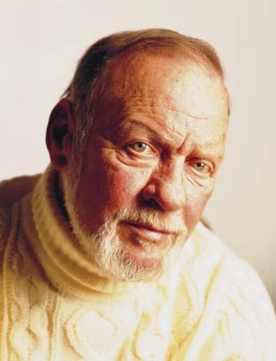
Napoleon Alphonseau Chagnon was an American cultural anthropologist, professor of sociocultural anthropology at the University of Missouri in Columbia and member of the National Academy of Sciences. Chagnon was known for his long-term ethnographic field work among the Yanomamö, a society of indigenous tribal Amazonians, in which he used an evolutionary approach to understand social behavior in terms of genetic relatedness. His work centered on the analysis of violence among tribal peoples, and, using socio-biological analyses, he advanced the argument that violence among the Yanomami is fueled by an evolutionary process in which successful warriors have more offspring. His 1967 ethnography Yanomamö: The Fierce People became a bestseller and is frequently assigned in introductory anthropology courses.

Pierre Clastres was a French anthropologist, ethnographer, and ethnologist. He is best known for his contributions to the field of political anthropology, with his fieldwork among the Guayaki in Paraguay and his theory of stateless societies. An anarchist seeking an alternative to the hierarchized Western societies, he mostly researched Indigenous peoples of the Americas in which the power was not considered coercive and chieftains were powerless.

Timothy Asch was an American anthropologist, photographer, and ethnographic filmmaker. Along with John Marshall and Robert Gardner, Asch played an important role in the development of visual anthropology. He is particularly known for his film The Ax Fight and his role with the USC Center for Visual Anthropology.

Yanomaman, also as Yanomam, Yanomáman, Yamomámi, and Yanomamana, is a family of languages spoken by about 20,000 Yanomami people in southern Venezuela and northwestern Brazil.
Patrick Tierney is an American writer based in Pittsburgh, Pennsylvania, who is the author of three books based on frequent visits to and field research in South America. As a mountain climber, he has worked with Johan Reinhard. He has made discoveries of Inca ceremonial mountaintop sites and, with Reinhard, made the second modern ascent of Mt. Del Veladero (21,115 ft) in Argentina in 1988. An Inca ceremonial platform and sacrificial site was discovered on top. Tierney has climbed all of the highest peaks in the Andes.

The Ax Fight (1975) is an ethnographic film by anthropologist and filmmaker Tim Asch and anthropologist Napoleon Chagnon about a conflict in a Yanomami village called Mishimishimabowei-teri, in southern Venezuela. It is best known as an iconic and idiosyncratic ethnographic film about the Yanomamo and is frequently shown in classroom settings.

Davi Kopenawa Yanomami, name also written Davi Kobenawä Yanomamö, is a Yanomami shaman and Portuguese-speaking spokesperson for the Yanomami People in Brazil. He became known for his advocacy regarding tribal issues and Amazon rainforest conservation when the tribal rights organization Survival International invited him to accept the Right Livelihood Award on its behalf in 1989. In 2019, Yanomami and the Hutukara Yanomami Association were also awarded the Right Livelihood Award. Yanomami spoke to both the British and Swedish parliaments about the catastrophic impact on Yanomami health as a consequence of the illegal invasion of their land by 40,000 ‘garimpeiros’ or goldminers. Prince Charles publicly called the situation ‘genocide’. In a seven-year period from 1987 to 1993 one fifth of the Yanomami died from malaria and other diseases transmitted by the miners.
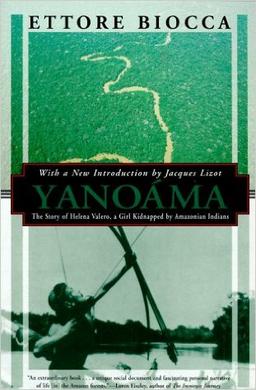
Yanoama: The Story of Helena Valero, a Girl Kidnapped by Amazonian Indians is a biography of Helena Valero, a mixed-race mestizo woman who was captured in the 1930s as a girl by the Kohorochiwetari, a tribe of the Yanomami indigenous people, living in the Amazon rainforest on the border between Venezuela and Brazil. She lived with the Yanomami for about two decades. While living with the Yanoama, Valero married twice and gave birth to four children. She escaped in 1956 to what she refers to as "the white man" in the country of her birth. After rejection by her family and living in poverty at a mission, Valero chose to return to life with the Yanomami.
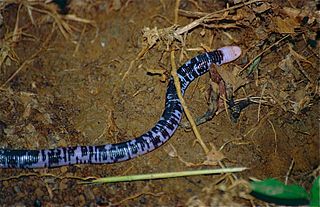
Amphisbaena fuliginosa, also known as the black-and-white worm lizard, speckled worm lizard or spotted worm lizard, is a species of amphisbaenian in the genus Amphisbaena. The ecology of A. fuliginosa is poorly known due to its fossorial habits. However, this species can be easily distinguished from others because of its characteristic white and black mosaic pattern that covers both the dorsal and ventral side.
Florinda Donner is an American writer and anthropologist known as one of Carlos Castaneda's "witches".
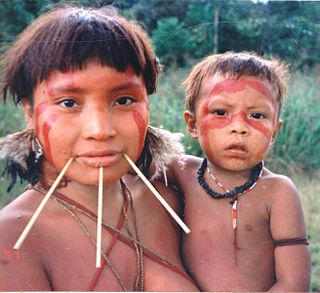
The Yanomami, also spelled Yąnomamö or Yanomama, are a group of approximately 35,000 indigenous people who live in some 200–250 villages in the Amazon rainforest on the border between Venezuela and Brazil.

Margarita Cadenas, is a Venezuelan-French director, producer and screenwriter.

The Yanomami people are an indigenous group who live in the Amazon Rainforest along the borders of Venezuela and Brazil. There are estimated to be only approximately 35,000 indigenous people remaining. They are interfluvial Indians who live in small villages along the Mavaca and Orinoco Rivers, with each village consisting of a single shabono, or communal dwelling. Largely uncontacted by the outside world, the Yanomami have been affected by illnesses introduced by gold miners since the 1980s. Anthropological studies have emphasized that the Yanomami are a violent people, and although this can be true, the women of the Yanomami culture generally abstain from violence and warfare. Although males dominate the Yanomami culture, Yanomami women play an important role in sustaining their lifestyle.

Secrets of the Tribe is a 2010 Brazilian documentary film by director José Padilha.
Kenneth Good is an anthropologist most noted for his work among the Yanomami and his account of his experiences with them: Into the Heart: One Man’s Pursuit of Love and Knowledge Among the Yanomami. While researching and living with the group in Venezuela, Good married a Yanomami girl named Yarima, who emigrated to the United States with Good when he returned home. Their three children were raised in the United States, but Yarima, finding adapting to life in the United States too difficult, returned to her village when the children were young.
The genocide of indigenous peoples in Brazil began with the Portuguese colonization of the Americas, when Pedro Álvares Cabral made landfall in what is now the country of Brazil in 1500. This started the process that led to the depopulation of the indigenous peoples in Brazil, because of disease and violent treatment by Portuguese settlers, and their gradual replacement with colonists from Europe and enslaved peoples from Africa. This process has been described as a genocide, and continues into the modern era with the ongoing destruction of indigenous peoples of the Amazonian region.

Yanomamö: The Fierce People is a 1968 book by American cultural anthropologist Napoleon Chagnon. It is an ethnographic study of the Yanomami people of the Amazon.
References
- 1 2 "Jacques Lizot". Pueblos Originarios. Archived from the original on 5 July 2022. Retrieved 26 December 2022.
- ↑ Lizot, Jacques (1976). The Yanomami in the Face of Ethnocide (PDF). IWGIA. Archived (PDF) from the original on 26 December 2022. Retrieved 26 December 2022.
- ↑ De Planhol, Xavier (1975). "Jacques Lizot, Metidja, un village algérien de l'Ouarsenis" (PDF). Études rurales (60): 116–117.[ permanent dead link ]
- 1 2 3 4 5 Borofsky, Rob (2005). Yanomami: The Fierce Controversy and What We Can Learn from It. University of California Press. p. 10. ISBN 978-0-520-93856-4.
- 1 2 3 Eakin, Emily (13 February 2013). "How Napoleon Chagnon Became Our Most Controversial Anthropologist". The New York Times. Archived from the original on 26 December 2022. Retrieved 26 December 2022.
- 1 2 3 Rains Wallace, David (12 November 2000). "The Left Hand of Darkness". Los Angeles Times. Archived from the original on 26 December 2022. Retrieved 26 December 2022.
- ↑ Herzog-Schröder, Gabriele (2022). "Processes of Modernization, Processes of Indigenization: An Amazonian Case (Yanomami, Southern Venezuela)". Indigeneity on the Move. p. 76. doi:10.1515/9781785337239-008.
- 1 2 3 "Fonds Lizot". France Archives (in French). Archived from the original on 26 December 2022. Retrieved 26 December 2022.
- 1 2 Parkin, Robert (2005). "The French-Speaking Countries". One Discipline, Four ways: British, German, French, and American anthropology. Chicago: University of Chicago Press. p. 237. ISBN 978-0-226-03827-8.
- 1 2 3 4 Mann, Charles C. (19 January 2001). "Anthropological Warfare". Science. 291 (5503): 416–421. doi:10.1126/science.291.5503.416. S2CID 220116822.
- ↑ Lizot, Jacques; Dart, Sarah (November 1994). "On warfare: An answer to N. A. Chagnon". American Ethnologist. 21 (4): 845–862. doi:10.1525/ae.1994.21.4.02a00100.
- ↑ Brohan, Mickaël (1 April 2003). "Des maladies, des biens, des guerres… et l'éthique en question : note sur l'affaire Tierney". Bulletin de l'Institut français d'études andines (in French). 32 (1): 151–184. doi: 10.4000/bifea.6446 . Archived from the original on 26 December 2022. Retrieved 26 December 2022.
- 1 2 Proctor, Robert N. (9 November 2000). "Anthropologists under fire: charges of abuse of a remote tribal people must be answered". Nature. 408 (6809). doi: 10.1038/35041611 . S2CID 4316826.
- ↑ Laden, Greg (2 May 2013). "Who is Fiercer: Yanomamö Indians or Dueling Tribes of Anthropologists?". Slate Magazine. Archived from the original on 10 October 2018. Retrieved 26 December 2022.
- ↑ DeFore, John (26 January 2010). "Anthropologists exposed in "Secrets of the Tribe"". Reuters. Archived from the original on 26 December 2022. Retrieved 26 December 2022.
- ↑ "Jacques LIZOT". Académie Française. Archived from the original on 26 December 2022. Retrieved 26 December 2022.